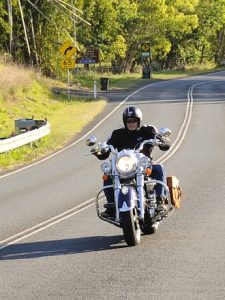Indian Motorcycle has donated a 2014 Indian Chief Vintage to Blue September which raises money and awareness to fight prostate, testicular, bowel, skin, lung and other cancers affecting Australian men.
The stylish, classic-styled soft-bagger cruiser is worth $31,495 rideaway and all you have to do to win it is log on to www.blueseptember.com.au, donate $10 and explain in 25 words or less why you or a special person in your life deserves to win the prestige prize.
Australian Indian Motorcycle dealers will also sell Blue September wristbands for $5 to raise awareness and much-needed funds for the Australian Prostate Cancer Research and Australian Cancer Research Foundation. Blue September has raised nearly $3 million since its inception six years ago.
They will also stage Blue September shop rides in Melbourne and Brisbane on Saturday (September 6) and Sydney on September 14.

Peter Harvey, Indian Motorcycle Australia’s Country Manager said the company jumped at the opportunity to support the important cause.
“Men who are 40-plus are the highest risk group – which also represents most of our customers,” he says. “If we can help get the message out to this demographic while also supporting research and early diagnosis, it is well worth it.”
The campaign has attracted high profile support from former Australian Idol judge Mark Holden, the Carlton’s Chris Judd, former AFL coach David Parkin, former rugby League great Lote Tuqiri, singer Reece Mastin and Sam Stynes, widow of former AFL great Jim Stynes.
The success of Blue September – the brainchild of Melbourne’s Mike Chapman – has spread across the globe to the UK, Ireland and New Zealand.
Mike says their campaign has a two-pronged approach: “Firstly, early diagnosis is vital. Men all too often present to the doctor too late with symptoms. Awareness through PR and media efforts helps change that. Secondly, cancer research is key. If you are diagnosed, funding ongoing research leads to better treatment options and outcomes.”


